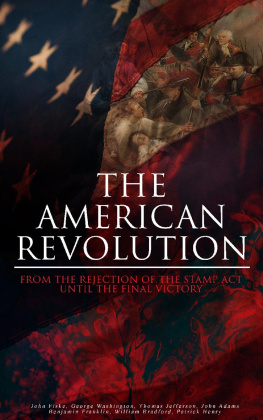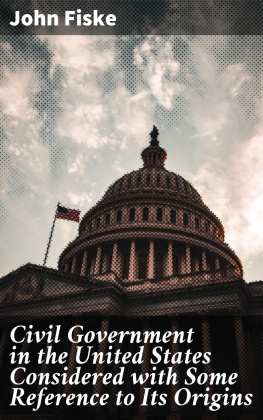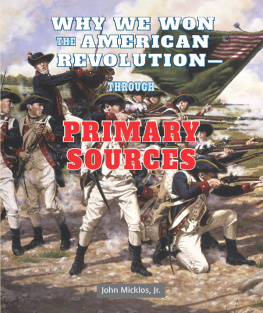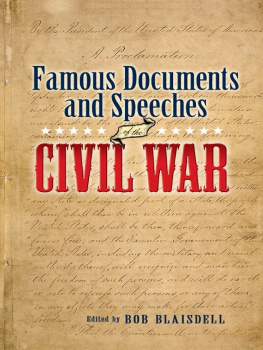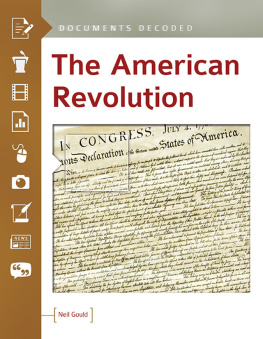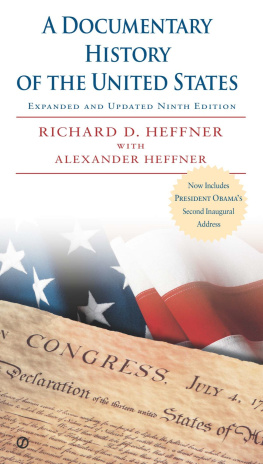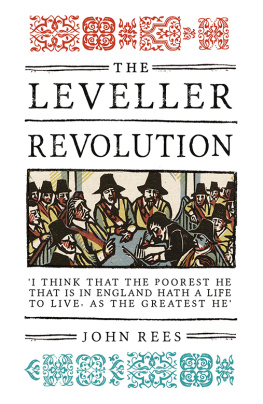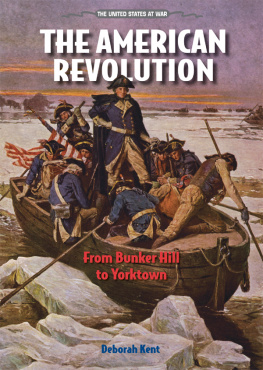John Fiske, George Washington, Thomas Jefferson, John Adams, Benjamin Franklin, William Bradford, Patrick Henry
The American Revolution: From the Rejection of the Stamp Act Until the Final Victory
Complete History of the Uprising; Including Key Speeches and Documents of the Epoch: First Charter of Virginia, Mayflower Compact, The Stamp Act, Continental Association, Declaration of Independence
Madison & Adams Press, 2019
Contact:
ISBN 978-80-268-9969-3
This is a publication of Madison & Adams Press. Our production consists of thoroughly prepared educational & informative editions: Advice & How-To Books, Encyclopedias, Law Anthologies, Declassified Documents, Legal & Criminal Files, Historical Books, Scientific & Medical Publications, Technical Handbooks and Manuals. All our publications are meticulously edited and formatted to the highest digital standard. The main goal of Madison & Adams Press is to make all informative books and records accessible to everyone in a high quality digital and print form.
Chapter I
The Beginnings
During the seventy years which elapsed between the overthrow of the Stuart dynasty and the victory of Wolfe on the Heights of Abraham, the relations between the American colonies and the British government were, on the whole, peaceful; and the history of the colonies, except for the great and romantic struggle with New France, would have been almost destitute of striking incidents. In view of the perpetual menace from France, it was clearly unwise for the British government to irritate the colonies, or do anything to weaken their loyalty; and they were accordingly left very much to themselves. Still, they were not likely to be treated with any great liberality,for such was not then, as it is hardly even yet, the way of governments,and if their attachment to England still continued strong, it was in spite of the general demeanour of the mother-country.
The Lords of Trade
Since 1675 the general supervision of the colonies had been in the hands of a standing committee of the Privy Council, styled the Lords of the Committee of Trade and Plantations, and familiarly known as the Lords of Trade. To this board the governors sent frequent and full reports of the proceedings in the colonial legislatures, of the state of agriculture and trade, of the revenues of the colonies, and of the way in which the public money was spent. In private letters, too, the governors poured forth their complaints into the ears of the Lords of Trade, and these complaints were many and loud. Except in Pennsylvania and Maryland, which were like hereditary monarchies, and in Connecticut and Rhode Island, where the governors were elected by the people, the colonial governors were now invariably appointed by the Crown. In most cases they were inclined to take high views regarding the royal prerogative, and in nearly all cases they were unable to understand the political attitude of the colonists, who on the one hand gloried in their connection with England, and on the other hand, precisely because they were Englishmen, were unwilling to yield on any occasion whatsoever one jot or tittle of their ancient liberties. Moreover, through the ubiquity of the popular assemblies and the directness of their control over the administration of public affairs, the political life of America was both really and ostensibly freer than that of England was at that time; and the ancient liberties of Englishmen, if not better preserved, were at least more conspicuously asserted. As a natural consequence, the royal governors were continually trying to do things which the people would not let them do, they were in a chronic state of angry warfare with their assemblies, and they were incessant in their complaints to the Lords of Trade. They represented the Americans as a factious and turbulent people, with their heads turned by queer political crotchets, unwilling to obey the laws and eager to break off their connection with the British Empire. In this way they did much to arouse an unfriendly feeling toward the colonies, although eminent Englishmen were not wanting who understood American affairs too well to let their opinions be thus lightly influenced. Upon the Lords of Trade these misrepresentations wrought with so much effect that now and then they would send out instructions to suspend the writ of habeas corpus, or to abridge the freedom of the press. Sometimes their acts were absurdly arbitrary. In New Hampshire, the people maintained that as free-born Englishmen they had the right to choose their representatives; but the governor held, on the contrary, that this was no right, but only a privilege, which the Crown might withhold, or grant, or revoke, all at its own good pleasure. To uphold the royal prerogative, the governor was instructed to issue writs for elections to some of the towns, while withholding them from others; but the resistance of the people to this piece of tyranny was so determined that the Lords of Trade thought it best to yield.
The governors salary
In Massachusetts, for more than thirty years, there went on an unceasing controversy between the General Court and the successive royal governors, Shute, Burnet, and Belcher, with reference to the governors salary. The Lords of Trade insisted that the governor should be paid a fixed salary; but lest this should make the governor too independent, the General Court obstinately refused to establish a salary, but made grants to the governor from year to year, in imitation of the time-honoured usage of Parliament. This method was, no doubt, inconvenient for the governors; but the colonists rightly valued it as one of the safeguards of popular liberty, and to their persistent refusal the Crown was obliged to give way. Similar controversies, in New York and South Carolina, were attended with similar results; while in Virginia the assembly more than once refused to vote supplies, on the ground that the liberties of the colony were in danger.
Such grievances as these, reported year by year to the Lords of Trade, and losing nothing in the manner in which they were told, went far to create in England an opinion that America was a lawless country, and sorely in need of a strong government. From time to time various schemes were proposed for limiting the powers of the colonial assemblies, for increasing the power of the governors, for introducing a titled nobility, for taxing the colonists by act of Parliament, or for weakening the feeling of local independence by uniting several colonies into one. Until after the French troubles had been disposed of, little came of any of these schemes.
SIR ROBERT WALPOLE
Sir Robert Walpole
A plan for taxing the colonies was once proposed to Sir Robert Walpole, but the sagacious old statesman dismissed it with a laugh. What! said he. I have half of Old England set against me already, and do you think I will have all New England likewise? From time to time the liberal charters of Rhode Island and Connecticut were threatened, but nothing came of this. But in one direction the Lords of Trade were more active. One of their most cherished plans was to bring about a union of all the colonies under a single head; but this was not to be a union of the kind which the Americans, with consummate statesmanship, afterward wrought out for themselves. It was not to be a union based upon the idea of the sacredness of local self-government, but it was a union to be achieved, as far as possible, at the expense of local self-government. To bring all the colonies together under a single viceroy would, it was thought, diminish seriously the power of each local assembly, while at the same time such a union would no doubt make the military strength of the colonies much more available in case of war.

